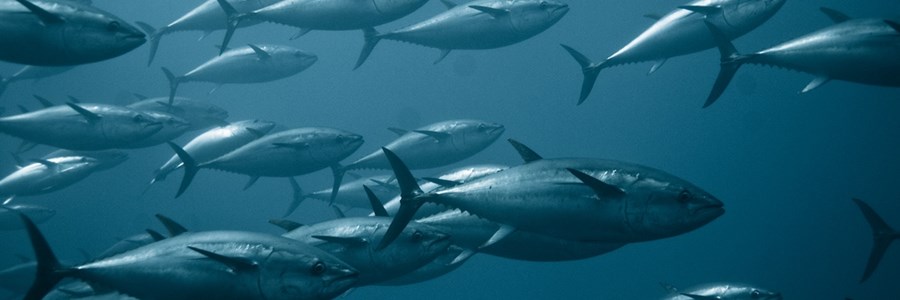Europêche regrets the Recommendations adopted by ICCAT on Bluefin tuna

After lengthy negotiations, the International Commission for the Conservation of Atlantic Tunas (ICCAT) has adopted this week a set of Recommendations on the management of tunas and tuna like species in the Atlantic Ocean and adjacent seas. Regarding bluefin tuna, ICCAT approved a gradual increase of the total allowed catch (TAC), which translates into 28,200 tonnes (t) in 2018, 32,240t in 2019 and 36,000t in 2020. The member organisations represented by Europêche have unanimously described these results as disappointing. Particularly, concerning the TAC for 2018, the entire sector expected to reach 32,000t in view of the positive scientific data that reported the full recovery of this emblematic species.
Likewise, Europêche believes that the EU has not been able to strike a balanced agreement since, besides not having achieved the desired TAC increase, ICCAT did modify the quota allocation scheme among the contracting parties to the detriment of EU operators.
According to Javier Garat, President of Europêche: 'This change in the distribution system means that the rest of the countries will receive more quotas at the expense of the quotas of the Europeans. The European Commission has not been able to adequately defend the interests of the EU and its fishermen, demonstrating that their strategy has been wrong.'
According to Europêche, although Europe will have a quota of around 15,850 tonnes in 2018, its catches will decrease 2.4 percentage points. It is foreseeable that the reduction will be even more pronounced in 2019 and 2020, being a decrease of 5.2 and 6.3 respectively, in favour to third countries, such as Algeria, Turkey, Tunisia, Egypt or Albania.
Finally, the sector fails to understand why, in light of the data presented by the scientific committee, ICCAT has decided not to replace the existing recovery plan with a management plan for Eastern Bluefin tuna. However, there is a commitment to do so by 2019.
Garat declared: 'A decade ago environmental groups were warning that Atlantic bluefin tuna was at risk of extinction unless a total ban on commercial fishing was put in place. This was far from being true since it was a problem of excessive fishing effort. In fact, today, only 10 years later, due to the joint efforts of fishermen, scientists and governments, the stock abundance is estimated to be at least twice as large as in 1950 which was considered already a historical record. In this context, there was still room for a higher TAC. Our fishermen have faced hefty cuts over the past years in their quotas which led to a successful recovery of the stock; yet again their efforts are not duly rewarded by the international community.'
Europêche celebrates, nevertheless, the agreements reached for the sustainable management of swordfish stocks in the North and South Atlantic, which involves measures that guarantee the future stability of stocks and is essential for the EU fishing fleets. In this sense and according to the representatives of Europêche participating in the meeting, the adopted measures allow continuity for a period of four years of the current quota levels, maintaining the same fisheries management conditions that have been applied for some years for these stocks.
Also important is the Recommendation for the management of the stock of shortfin mako, which establishes conditions for the capture and retention of these sharks that will require a significant effort to the sector. According to the Recommendation, live specimens arriving on board should be released and only those caught dead under certain conditions may be retained. With this Recommendation, the closure of the fishery is avoided and a certain activity is maintained without setting a TAC, with the forecast of a recovery of this fish population, whose situation will be reviewed by the ICCAT Scientific Committee in 2019.
The sector regrets that the fin-attached policy enforced in the EU and strictly implemented by European operators was not adopted by ICCAT. The sector recalls that EU fishermen never practiced the so-called 'shark finning[1]' since both the body and fins where successfully marketed by our fishermen. However, foreign operators who are susceptible to these barbarous practices, threatening the state of these stocks will not abide by these rules.
Regarding the Northern albacore tuna fishery, ICCAT has adopted a Recommendation that increases fishing opportunities from 28,000 tonnes to 33,600 tonnes, which translates into greater availability of quotas for the EU fishing fleet.
Finally, with respect to tropical tuna, ICCAT has adopted a Recommendation to prohibit the discards of tuna from purse-seine vessels. According to the EU tuna fleet, this Recommendation is in line with existing European practices, which have contributed for years, to the food security of African countries. However, the sector regrets that this obligation has not been extended to other fleets, such as Asian longliners, which are allowed to continue discarding tuna species.
Other discussions revolved around the use of the so-called 'FADs[2]'. EU tuna industry representatives stressed that they have voluntarily adopted a series of self-imposed management measures, at their own expense, to ensure the best standards for sustainable tuna exploitation across all oceans. Our tuna industry have 100% observer coverage onboard, fully documented catches, a total replacement of FADs by non-entangling ones and even developed a standard certifying full compliance with sustainable fishing practices.
Ends
Europêche represents the fisheries sector in Europe. Currently, the Association comprises 14 national organisations of fishing enterprises from the following 10 EU Member States: DE, DK, ES, FR, IT, MT, NL, LV, PL, UK.
Press contacts:
Daniel Voces, Acting Managing Director of Europêche: +32.2.230.48.48 daniel.voces@europeche.org
[1] Shark finning refers to the removal and retention of shark fins on board while the remainder of the shark is discarded in the ocean.
[2] Fishing aggregating devices are floating objects that have been employed for hundreds of years in commercial fisheries to improve methods when catching ocean going pelagic species including tuna.
Sources: Europeche
Attachments: